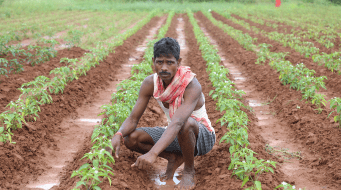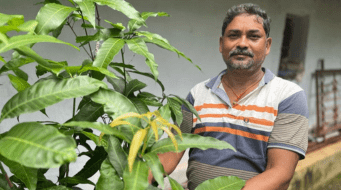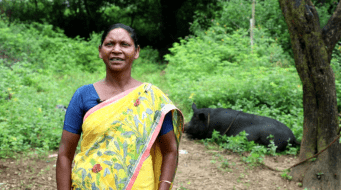Showcasing 9 studies on Vulnerabilities, Resilience and Adaptation
“Adaptation Futures is the world’s premier conference on climate change adaptation…This is the first time the conference is held on the African continent.
We aim to use this setting to foreground developing country adaptation issues
and increase developing world and African participation.”
This is the notion behind this year’s Adaptation Futures conference which is being held in Cape Town, South Africa. The conference boasts of having over 200 participants from various sectors, countries and organisations ranging from UN representatives, NGOs, Implementing Agencies, Government body representatives, reputed Universities etc. in the field of Climate Change Adaptation and Research. WOTR has therefore been selected as one of organisations with relevant and impactful research that is being featured in the conference.
Watershed Organisation Trust (WOTR) is a globally recognized organization dedicated to
transforming the lives of millions across India in participatory watershed development and eco-systems restoration, adaptive sustainable agriculture, integrated and efficient water management, and climate change adaptation, with a special emphasis on vulnerable communities, farmers, and women. The strength we have is applied and action research (handled by W-CReS and WOTR) which could translate into implementable ground-level interventions. WOTR and W-CReS are showcasing 9 of these studies at this year’s Adaptation Futures Conference. These studies cut across following themes:
I. Vulnerabilities: Identifying and Addressing them
a. Understanding farming system transitions and their impact on livelihoods, social inclusion and the environment in semi-arid Telangana, India, written and presented by Bhavana Rao Kuchimanchi on 21/06/2018 between 14:15 hrs-16:00 hrs (session number S305; Oral presentation) in room 2.64 at AF2018.
b. Extreme events and associated risk: implications on vulnerabilities, written by
Aradhana Yaduvanshi, Ashwini Kulkarni (IITM, India) and Ramkumar Bendapudi and presented by Ramkumar Bendapudi on 21/06/2018 between 13:45 hrs – 14:15 hrs
and 16:00 hrs – 16:30 hrs
c. Integrating Climate Science and Participatory Vulnerability Assessments to Reorient
Watershed Planning Process: A Methodological Experience, written by Divya
Nazareth and Bhavana Rao Kuchimanchi and presented by Bhavana Rao
Kuchimanchi on 20/06/2018 between 13:45 hrs – 14:15 hrs and 16:00 hrs – 16:30 hrs
d. Wellbeing as a methodology in identifying differential vulnerability in a community:
A Study in the semi-arids of Maharashtra, written and presented by Bidisha Sinha on
21/06/2018 between 13:45 hrs – 14:15 hrs and 16:00 hrs – 16:30 hrs
e. Understanding the vulnerabilities and resilience of the local communities to climatic
and non-climatic risks, written and presented by Marcella D’Souza and Anuradha
Phadtare on 19/06/2018 between 13:45 hrs – 14:15 hrs and 16:00 hrs – 16:30 hrs
II. Adaptation: What it means in the real world?
a. Cost of climate change adaptation in semi-arid regions – estimates from central
India, written by Arjuna Srinidhi and Arpan Golechha and presented by Arjuna Srinidhi
on 21/06/2018 between 9:15 hrs-11:00 hrs (session number S326; Oral Presentation) in room 2.45 at AF2018.
b. Adaptation or maladaptation: Case of farm ponds converted into storage tanks in
Maharashtra – Implications for groundwater governance, written by Ramkumar
Bendapudi, Renie Thomas, Ankita Yadav and Sarita Chemburkar and presented by
Renie Thomas on 20/06/2018 between 13:45 hrs – 14:15 hrs and 16:00 hrs – 16:30
hrs
c. Managing agricultural risk through Crop Insurance in Maharashtra- Institutional
framework and its acceptance amongst farmers in the Ahmednagar district, written
by Bidisha Sinha and Arpan Golechha and presented by Bidisha Sinha on
20/06/2018 between 13:45 hrs – 14:15 hrs and 16:00 hrs – 16:30 hrs
d. Micro-Irrigation at the Margins: Unpacking Technological Choice and Barriers to uptake in Semi-Arid India, written and presented by Karan Misquitta on 21/06/2018 between 11:30 hrs-13:15 hrs (session number S306; Oral Presentation) in room 2.45 at AF2018.
e. Agro-meteorological services in semi-arid India: Lessons from innovating in service delivery, written and presented by Ramkumar Bendapudi under the parallel session S132- “It’s not just about data – Demand-driven climate services for better adaptation decision-making” by GIZ on 20/06/2018 between 9:15hrs-11:00hrs in room 2.46 at AF2018
About the WOTR/W-CReS team at Adaptation Futures, 2018
1. Marcella D’Souza: As the Executive Director of WOTR, Marcella has over 25 years of experience working with vulnerable communities in the fields of community health, gender development and action research at the ground level. She also conceived and led the establishment of the WOTR Centre for Resilience Studies (W-CReS) and leads the multi-disciplinary research work undertaken here.
2. Bhavana Rao Kuchimanchi: Bhavana is the Regional Manager of WOTR’s team in Hyderabad and a PhD Researcher from Wageningen University, Netherlands, with interests in understanding rural vulnerabilities, agriculture and livestock systems etc. and handles WOTR’s work in Andhra Pradesh and Telangana.
3. Ramkumar Bendapudi: Ramkumar is the Lead Research Advisor at WOTR with keen research interests in Economics, Agriculture and Livestock, Climate Change and Climate Science and its Relationship with Biophysical Attributes of Ecosystems. He mentors the W-CReS Research team on various occasions.
4. Bidisha Sinha: Bidisha is a former Economics Researcher at WOTR/W-CReS and maintains research interests in Economics, Climate Change, Water Resources, Vulnerability and Adaptation etc.
5. Anuradha Phadtare: Anuradha is a Social Researcher at WOTR/W-CReS and responsible for various studies ranging from Impact Assessments of Watersheds, Gender Research, Farming Systems, Understanding and Identifying Vulnerabilities etc.
6. Arjuna Srinidhi: Arjuna is a Climate Policy specialist at WOTR and Adaptation, Climate
Change, Development and Sustainable Development, Traditional Knowledge, Agriculture etc. fall among his research interests.
7. Renie Thomas: Renie is a former Hydrogeologist who headed WOTR/W-CReS’ Hydrology team. His research interests range from Groundwater to Aquifer Systems, Geology, Adaptation and Maladaptation, Water policy, Climate Change etc.
8. Karan Misquitta: A former researcher at WOTR/W-CReS, Karan is pursuing his PhD in his topic of interest- Irrigation. He is also interested in research under adaptation, water, water governance, Research in Use, Games for Impact etc.
The various research themes will be showcased at Adaptation Futures. Please refer to the poster schedule for more information.
You could also take a look at the Abstract Book for an insight into what topics are being talked about at Adaptation Futures this year. For WOTR’s studies, please visit: https://wotr.org/wotr_at_adaptation_futures_2018





